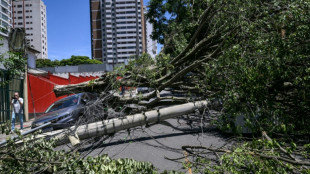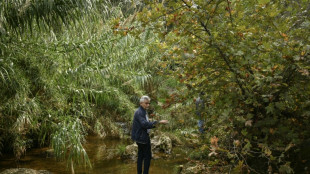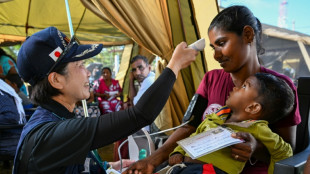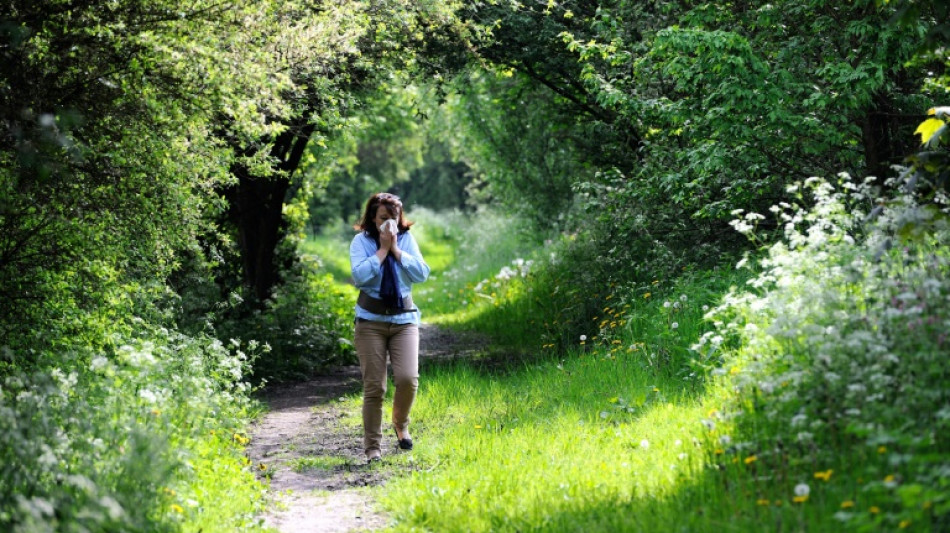
-
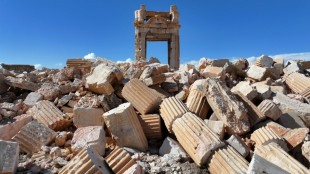 US troops in Syria killed in alleged IS ambush
US troops in Syria killed in alleged IS ambush
-
Jalibert masterclass guides Bordeaux-Begles past Scarlets

-
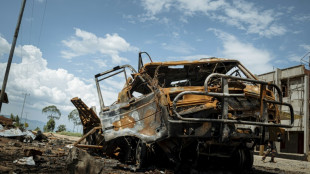 M23 marches on in east DR Congo as US vows action against Rwanda
M23 marches on in east DR Congo as US vows action against Rwanda
-
Raphinha double stretches Barca's Liga lead in Osasuna win

-
 Terrific Terrier returns Leverkusen to fourth
Terrific Terrier returns Leverkusen to fourth
-
Colts activate 44-year-old Rivers for NFL game at Seattle

-
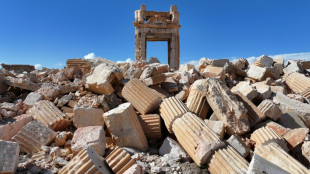 US troops in Syria killed in IS ambush attack
US troops in Syria killed in IS ambush attack
-
Liverpool's Slot says 'no issue to resolve' with Salah after outburst

-
 'Stop the slaughter': French farmers block roads over cow disease cull
'Stop the slaughter': French farmers block roads over cow disease cull
-
Stormers see off La Rochelle, Sale stun Clermont in Champions Cup

-
 Maresca hails Palmer as Chelsea return to winning ways against Everton
Maresca hails Palmer as Chelsea return to winning ways against Everton
-
Hungarian protesters demand Orban quits over abuse cases
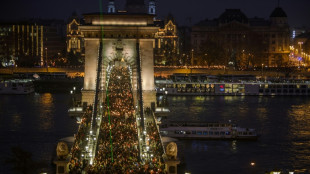
-
 Belarus frees protest leader Kolesnikova, Nobel winner Bialiatski
Belarus frees protest leader Kolesnikova, Nobel winner Bialiatski
-
Salah sets up goal on return to Liverpool action

-
 Palmer strikes as Chelsea return to winning ways against Everton
Palmer strikes as Chelsea return to winning ways against Everton
-
Pogacar targets Tour de France Paris-Roubaix and Milan-San Remo in 2026

-
 Salah back in action for Liverpool after outburst
Salah back in action for Liverpool after outburst
-
Atletico recover Liga momentum with battling win over Valencia

-
 Meillard leads 'perfect' Swiss sweep in Val d'Isere giant slalom
Meillard leads 'perfect' Swiss sweep in Val d'Isere giant slalom
-
Salah on Liverpool bench for Brighton match

-
 Meillard leads Swiss sweep in Val d'Isere giant slalom
Meillard leads Swiss sweep in Val d'Isere giant slalom
-
Indonesia flood death toll passes 1,000 as authorities ramp up aid
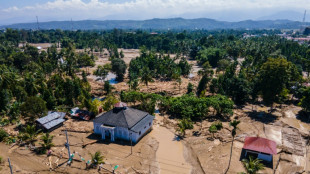
-
 Cambodia shuts Thailand border crossings over deadly fighting
Cambodia shuts Thailand border crossings over deadly fighting
-
First urban cable car unveiled outside Paris
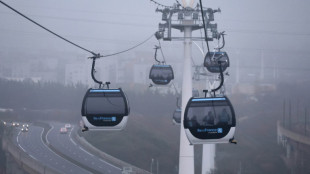
-
 Vonn second behind Aicher in World Cup downhill at St Moritz
Vonn second behind Aicher in World Cup downhill at St Moritz
-
Aicher pips Vonn to downhill win at St Moritz

-
 Thailand says 4 soldiers killed in Cambodia conflict, denies Trump truce claim
Thailand says 4 soldiers killed in Cambodia conflict, denies Trump truce claim
-
Fans vandalise India stadium after Messi's abrupt exit

-
 Women sommeliers are cracking male-dominated wine world open
Women sommeliers are cracking male-dominated wine world open
-
Exhibition of Franco-Chinese print master Zao Wou-Ki opens in Hong Kong

-
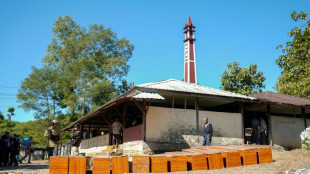 Myanmar junta denies killing civilians in hospital strike
Myanmar junta denies killing civilians in hospital strike
-
Why SpaceX IPO plan is generating so much buzz

-
 Thailand continues Cambodia strikes despite Trump truce calls
Thailand continues Cambodia strikes despite Trump truce calls
-
US envoy to meet Zelensky, Europe leaders in Berlin this weekend
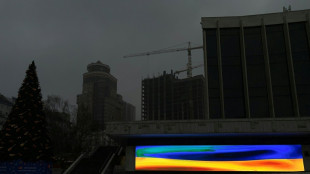
-
 North Korea acknowledges its troops cleared mines for Russia
North Korea acknowledges its troops cleared mines for Russia
-
US unseals warrant for tanker seized off Venezuelan coast

-
 Cambodia says Thailand still bombing hours after Trump truce call
Cambodia says Thailand still bombing hours after Trump truce call
-
Machado urges pressure so Maduro understands 'he has to go'

-
 Leinster stutter before beating Leicester in Champions Cup
Leinster stutter before beating Leicester in Champions Cup
-
World stocks mostly slide, consolidating Fed-fuelled gains
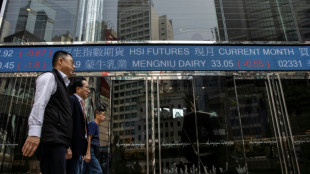
-
 Crypto firm Tether bids for Juventus, is quickly rebuffed
Crypto firm Tether bids for Juventus, is quickly rebuffed
-
Union sink second-placed Leipzig to climb in Bundesliga

-
 US Treasury lifts sanctions on Brazil Supreme Court justice
US Treasury lifts sanctions on Brazil Supreme Court justice
-
UK king shares 'good news' that cancer treatment will be reduced in 2026
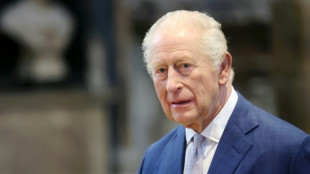
-
 Wembanyama expected to return for Spurs in NBA Cup clash with Thunder
Wembanyama expected to return for Spurs in NBA Cup clash with Thunder
-
Five takeaways from Luigi Mangione evidence hearings

-
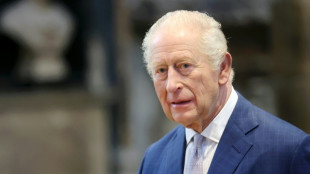 UK's king shares 'good news' that cancer treatment will be reduced in 2026
UK's king shares 'good news' that cancer treatment will be reduced in 2026
-
Steelers' Watt undergoes surgery to repair collapsed lung

-
 Iran detains Nobel-prize winner in 'brutal' arrest
Iran detains Nobel-prize winner in 'brutal' arrest
-
NBA Cup goes from 'outside the box' idea to smash hit


Longer exposure, more pollen: climate change worsens allergies
Runny nose, itching eyes, worsening asthma symptoms -- the effects of hay fever are nothing to sneeze at, experts say, warning of an "explosion" of allergies as climate change lengthens and intensifies pollen seasons.
The UN's World Meteorological Organization (WMO) has found that a shifting climate has already begun altering the production and distribution of pollen and spores.
As winter frost thaws earlier and spring weather gets warmer, plants and trees flower earlier, extending the pollen season, numerous studies have shown.
Air pollution can also increase people's sensitivity to allergens, while invasive species are spreading into new regions and causing fresh waves of allergies.
More and more people, particularly in industrialised nations, have reported developing allergy symptoms in recent decades.
Around a quarter of adults in Europe suffer from airborne allergies, including severe asthma, while the proportion among children is 30 to 40 percent.
That figure is expected to rise to half of Europeans by 2050, according to the World Health Organization.
"We're in crisis because allergies are exploding," said Severine Fernandez, president of the French Allergists' Union.
Whereas previously an allergic person would endure only what is commonly known as hay fever, albeit sometimes for years, "now that person can become asthmatic after one or two years", Fernandez said.
- 'Irritant pollen' -
Climate change affects allergy patients in multiple ways, according to a 2023 report by the WMO.
Rising levels of carbon dioxide, one of the main heat-trapping gases produced by burning fossil fuels, boost plant growth, in turn increasing pollen production.
Air pollution not only irritates the airways of people exposed, but it also causes stress to plants, which then produce more "allergenic and irritant pollen".
Nicolas Visez, an aerobiologist at the University of Lille, said each plant species reacted differently to a variety of factors such as water availability, temperature and CO2 concentrations.
Birch trees for example will wither as summers get hotter and drier, while the heat causes a proliferation of ragweed, a highly allergenic invasive plant.
"There's no doubt that climate change is having an effect," Visez said.
In a study published in 2017, researchers projected that ragweed allergies would more than double in Europe by 2041-2060 as a result of climate change, raising the number of people affected from 33 million to 77 million.
The authors suggested that higher pollen concentrations as well as longer pollen seasons could make symptoms more severe.
- Allergy action -
A Europe-wide "AutoPollen" programme under development aims to provide real-time data on the distribution of pollen and fungal spores.
In Switzerland, a tie-up with MeteoSwiss allows patients and doctors to match personal allergy profiles with maps of specific allergens throughout the country.
In parts of France, authorities have planted "pollinariums", gardens packed with the main local allergen species.
These provide information on the very first pollen released into the air so that people can start taking antihistamines and other protective measures in a timely manner.
"Hazelnuts have started to bloom as early as mid-December, which wasn't the case before," said Salome Pasquet, a botanist with the association behind the pollen gardens.
"That's really because we've had very mild winters, so flowering has come earlier," she said.
Some countries are taking an interventionist approach -- cutting off the pollen at the source.
In Japan, the government announced a plan in 2023 to combat allergies caused by the archipelago's many cedar trees, which includes felling cedars to replace them with species that produce less pollen.
Countries in Europe are also more mindful of species in the environment, both native ones that have been planted and invasive newcomers like ragweed.
Preference is given to species with a lower allergenic potential, such as maple or fruit trees.
"The idea is not to stop planting allergenic species," Pasquet said, but to be mindful of creating diversity and avoiding having "places where there are rows of birch trees, as was the case a few years ago".
It was birch trees in a client's garden that originally set off symptoms for Simon Barthelemy, an architect who lives near Paris.
"I had a major eye allergy, and it's been a recurring problem every year since," he said.
"I'm on antihistamines, but if I don't take them I get itchy eyes, I'm very tired, I cough... I can't sleep at night."
Z.AlNajjar--SF-PST

